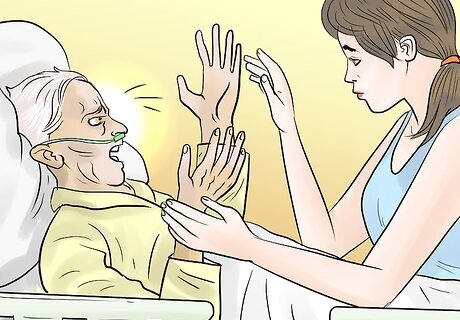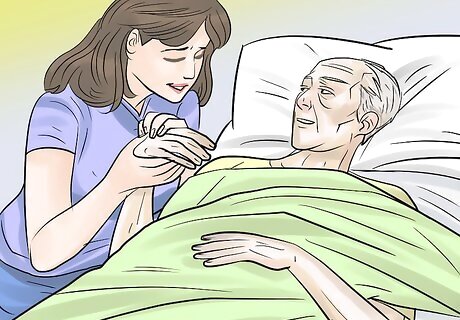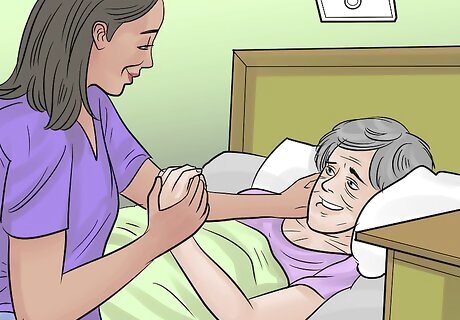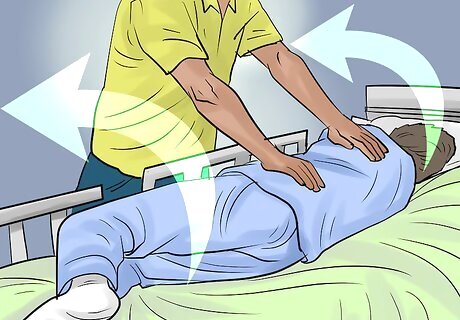
views
Acknowledging the Situation

Face the situation. Though it may be difficult, you should not pretend that everything is okay. You should not lie to your loved one or yourself. Though it may be uncomfortable and hard to deal with, not facing the fact that your parent is dying can cause additional stress and pain. If you don’t know what to say, listen to what your parent says about death and dying. If they bring the subject up, respond to them. Don’t change the subject.

Practice empathy. Taking care of dying parents can be frustrating and difficult. You may be able to see how much pain your parent is in and how upset they are because of their condition. Through your frustration, just remember how difficult it is for your parent to be dying and have a decreased quality of life. Your parent may snap at you, stop talking, become dejected, or act in other negative ways. Don’t take it to heart or lose your temper with them.

Talk about your emotions. You and your parent should communicate about the way you feel. Don’t think that you should only be strong and act happy for the sake of your parent. If you are honest about the way you feel, then your parent will feel like they can be honest, too.

Allow your parent to accept death. Grief comes in five stages, but people do not go through the stages in the same way. People also deal with death and accept it in different ways. Allow your parent to accept their death in their unique way. For example, some people may start planning for their deaths but also buy vacation packages for a time after they will be gone. Trying to get your parent to snap out of the denial stage is futile. Just let them go through it and support them.
Recognizing Your Parent’s Wishes
Decide with your parent if hospice care is the right option. End-of-life care is a personal decision, but often when treating the illness is no longer an option, hospice care might be the best solution. Hospice care involves care meant to relieve any suffering or pain caused by an illness, along with support, and is available to those who are expected to pass within six months.[[[Image:Care for a Dying Parent Step 5.jpg|center]] To qualify for hospice care, a doctor must certify that your parent is terminally ill and has six months or less to live. Many receive hospice care when they have stopped treatment for the illness and wish simply to be comfortable and as pain-free as possible. Hospice care may be a good choice if your parent would like to spend less time at the hospital and more time at home. If inpatient treatment becomes necessary, this can be arranged by the hospice. This type of care can also be helpful if your parent needs help with everyday tasks, such as eating, dressing, bathing, and walking.

Help your parent come up with an advance directive. An advance directive is a legal document. The document provides instructions to doctors, nurses, and other medical personnel about your parent’s wishes if they become unresponsive or unable to make medical decisions for themselves. Each state has different laws for advance directives, so ask your doctor or research the guidelines for your area. Talk to your parent about their wishes. Do not make decisions for them. Even if you don’t agree, if after discussion your parent still wants that care, respect their decision. Decide what end-of-life care your parent would like. For example, ask they if they would like to be kept on life support. You should also decide what medical procedures your parent will agree to and won’t agree to if they are unable to decide for themselves. Discuss options with your parent’s doctor if you are not sure what should be included.

Draw up a power of attorney. Your parent should also come up with a power of attorney. This is another document that provides your parent’s instructions in case they are unable to provide it. The power of attorney specifically gives a designated person the responsibility to make decisions for your parent if they cannot make them for themselves. The person named in the power of attorney should be someone your parent trusts completely. The person should be able to make decisions based on your parent’s wishes, not their own ideas. Your parent should have a conversation with the person they name as their power of attorney. The person needs to learn your parent’s wishes so they can make sure all decisions are ones your parent would make.
Spending Time with Your Parent

Be there for your parent. Even if you cannot take care of your parent all the time, you can still be there for them during important times. You can visit them, go with them to appointments, or spend time with them. Even though it may hurt you to see them in their condition, don’t ignore them or refuse to go see them. For example, if they go into the hospital, make sure that you go visit them there. Go to doctor’s appointments or treatments with them. Go visit them in a non-medical capacity. Being with them lets them know you care and can give them comfort during difficult times.

Focus on meaningful conversations. When your parent is nearing the end of their life, they may want to talk about certain important things. This may include memories or stories they would like to share with you before they are gone. They may want to talk about regret and forgiveness, or even explore reasons they should be thankful. Don’t try to deter them from these conversations. Instead, encourage them and listen to your parent. Pay attention to what your parent says. Often, people try to tell loved ones messages or get them to understand something they may not understand how to say. Listen closely to what your parent says and try to get the message they want to convey.

Touch your parent. Dying people often feel depressed, anxious, and isolated. This may stem from people avoiding them because they don’t want to face the fact that they are dying. Maintaining a physical closeness is important in the last months of a person’s life. To help with this, touch the person and stay close to them. This may include hugs or holding hands. You may put a comforting hand on their arm. Sometimes, a gentle massage can help them not only relax, but also feel connected.

Ask your parent how they want to spend their time. People want to spend their final days in different ways. Some people like to have large groups around them and see all their family and friends. Others may like only one or two people with them at a time. Ask them what would make them comfortable or happy. You can also ask them if they would like to listen to music or watch television. This can often be comforting. However, some people don’t like noise and find it distracting and hard on their senses.
Managing Your Parent’s Condition

Discuss the prognosis with the doctor. When you find out that your parent is dying, talk to the doctor. Find out what treatment will be done and what management techniques should be used. You need to find out how much care they will need and what arrangements you can make for it. If you are not going to be the primary caregiver, get your parent’s permission to discuss medical needs with them.

Talk to the doctor about treating and managing symptoms. Often, people who are dying undergo pain management to help with their pain. Other problems, like respiratory or digestive problems and fatigue, are also something doctors treat terminal patients for or help them learn how to manage. Discuss your parent’s treatment and management plan with their doctor, and be sure to let the doctor know if something isn't working. Often, morphine and other painkillers are prescribed to help ease pain and provide comfort. Morphine also helps with shortness of breath. Medications can also be prescribed for nausea or vomiting. Dry skin can occur in terminal patients. Alcohol-free lotions and lip balms can help skin and lips, while ice chips or damp cloths can help with dry mouth.

Turn your parent often. Bed sores are a common problem when people are bedridden and dying. To help prevent bed sores, your parent should be turned every few hours. Turn them from their side to their back, and then to the other side. Bed sores often occur on heels, hips, lower back, and the base of the skull. Foam placed under heels or elbows may help prevent bed sores. Keeping your parent clean and their skin moisturized can also help.

Offer to help feed them. If your parent is too weak or doesn’t have the energy to eat, you can help them. Offer to feed them, making sure to do it slowly. Give them enough time to chew and swallow. Offer them food in small portions and avoid feeding them too much at once. Offer them their favorite foods if they are able to eat them. Don’t force them to eat. Some people stop eating when they are close to dying for many reasons. You may encourage them to eat, but never force them.

Control the temperature. People who are dying may be sensitive to temperatures. They may be hot or cold regardless of the outside temperature. Often, they may not tell you, so watch for signs. If they are cold, make sure they have blankets and warm clothes, and turn up the heat. If they are cool, remove excess blankets, turn on a fan, and give them a cool cloth. If they are cold, they may shiver, pull the covers around them, or have a rigid body posture. If they are hot, they may be flush or sweating, and they may kick any blankets away.
Taking Care of Yourself

Join a support group. If you are the caregiver or just are dealing with your parent dying, consider joining a support group. You can join one that deals specifically with terminal illness and grief. If you take care of your parent, you can join a caregiver support group. This can give you some much needed emotional support during this trying time. You may also receive tips or ideas to help care for your parent. Talk to the doctor or local hospital about any support groups in your area. You can also look online, or join an online support group.

Find ways to relax. You may feel like taking care of yourself is the last thing you should be worried about while your parent is dying. However, running yourself ragged will not help anyone. Make sure you take breaks, find ways to relax, and not let yourself get too run down. Talk to your family and friends. This can be very therapeutic, especially since this is a difficult situation.

Ask for help. You cannot do everything alone. There is nothing wrong with asking others for help. This might be to do errands for you, stay with your parent so you can take a break, make dinner, or just to listen when you need it. You can ask siblings, your significant other, children, or other family members to help. If you or your parent have close family friends, see if they can help out. If you or your parent are involved in a religious organization, you may want to ask a religious leader for help. Often, these people can be great sources of help and support. You can also hire a home care worker to assist you. You can specify what exactly you need help with (providing meals, cleaning the house, medical care, and so on) and hire a home care agency to send assistance, or privately hire someone of your choosing.


















Comments
0 comment